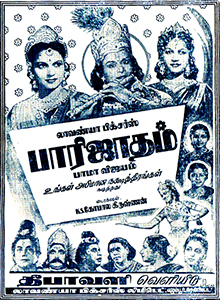Top Qs
Timeline
Chat
Perspective
Parijatham (1950 film)
1950 Indian film From Wikipedia, the free encyclopedia
Remove ads
Parijatham (/pɑːrɪdʒɑːðəm/) is a 1950 Indian Tamil language Hindu mythological film directed by K. S. Gopalakrishnan,[a] starring T. R. Mahalingam, M. V. Rajamma and B. S. Saroja. It was released on 9 November 1950.[1]
Remove ads
Plot
The film has three storylines.
The first line which is the first part is about the well known myth of Narakasura. Narakasura, the demon king has invincible powers due to the boons he had received from Devas and with all that he wreaks havoc on everyone. Narada knows that only Bama, the wife of Krishna who was Naragasura's mother in the previous birth can annihilate him. Narada adept in his covert ways to achieve his goals subtly gifts a parijatham flower to Krishna and make him in turn gift it to his first wife Rukmani. As expected the demon king dies at the hands of Bama but not before making a request that his day of death be celebrated by people as Deepavali.
The next story line has the same parijatham that breeds enmity in Bama against Rukmani. Finally she understands that Rukmani's devotion to Krishna far exceeds her own, a humbling experience.
There is a third line which is a comic interlude that intersects the film throughout. N.S.krishnan, T.A.Mathuram and side kicks Kaka Radhakrishnan and Pulimootai Ramasamy take care of that.
Remove ads
Cast
Cast according to the opening credits:
|
|
|
Remove ads
Production
The film was produced by S. K. Sundararama Iyer under the banner Lavanya Pictures and was shot at Newtone and Vauhini studios. The film was directed by K. S. Gopalakrishnan B. A.[a] Screenplay and dialogues were written by Elangovan. Jithen Banerji was in charge of cinematography while Kumaradevan was the operative cameraman. Editing was done by A. V. Subba Rao. Dinsha K. Tehrani was in charge of audiography. Art direction was done by F. Nagoor while Hiralal did the choreography.[1]
Soundtrack
Summarize
Perspective
Music was composed by C. R. Subbaraman and S. V. Venkatraman.[citation needed]
Remove ads
Reception
Swadesamitran praised the film citing the film moves faster without getting bored anywhere, while Dinamani wrote that propaganda humor is well handled and added the film had melodious songs and good direction, and Kalki praised the makers for adapting mythology stories nicely for present generation and added its a musical film due to good songs.[2] Historian Randor Guy said the film is remembered for the satire-rich comedy of N. S. Krishnan.[3]
Remove ads
Notes
References
External links
Wikiwand - on
Seamless Wikipedia browsing. On steroids.
Remove ads

